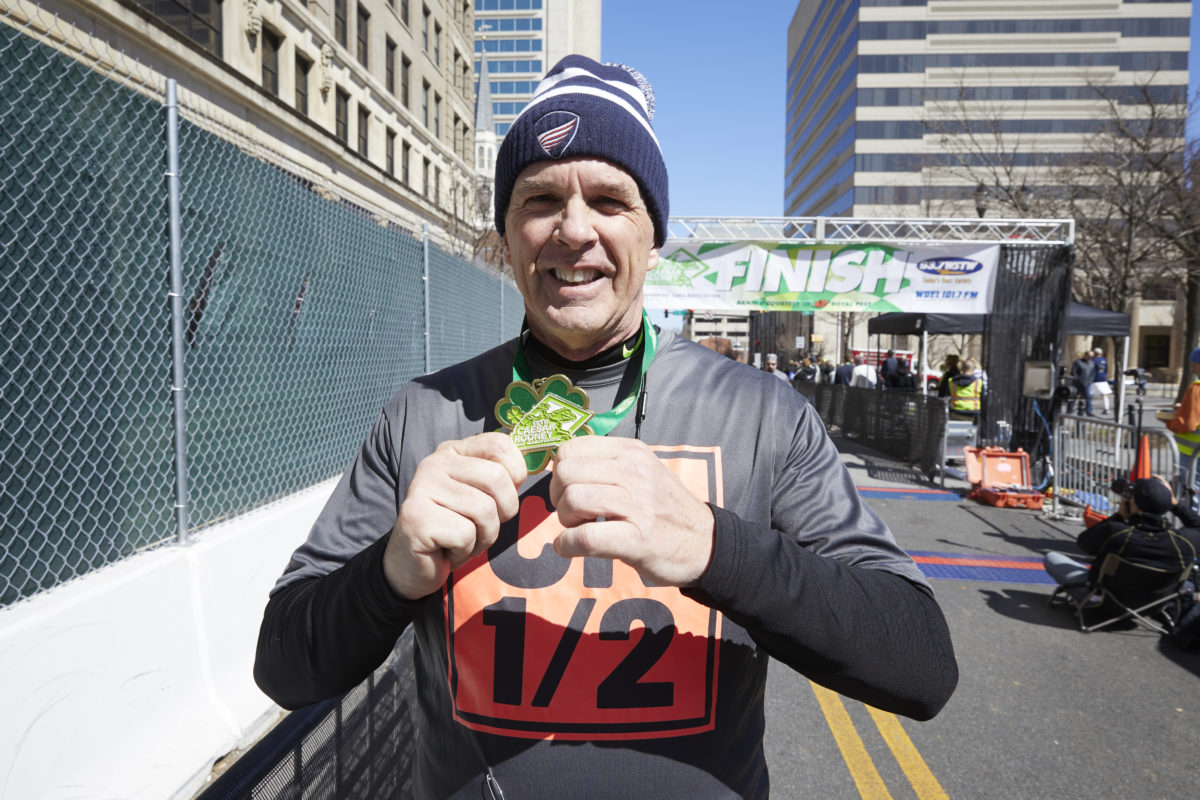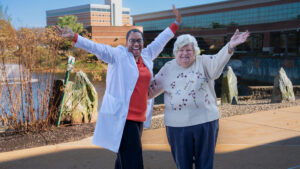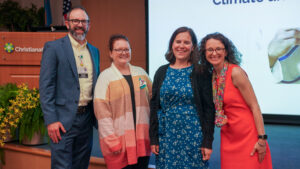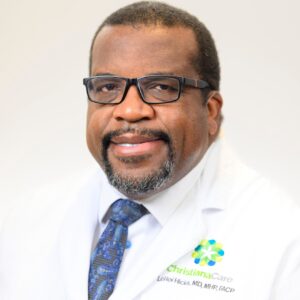When Mark Kleinschmidt crossed the 5K finish line on Main Street in Newark on New Year’s Day, he wasn’t running alone. The former president of the New Castle County Chamber of Commerce carried with him in spirit the medical, nursing and rehabilitation experts from Christiana Care Health System who helped him hit the road again just four months after surviving a catastrophic heart attack.
Kleinschmidt took up running a few years ago to participate in fundraising races sponsored by Chamber members. He found it a great way to connect with the community and stay in shape.
On August 17, 2017, a heart attack stopped him in his tracks.
By pure chance, Kleinschmidt’s daughter Allison, who is a nurse in Philadelphia, was home that morning picking up some things from her parents’ house. She immediately recognized what was happening with her dad, gave him two aspirin and called 911. She performed aggressive cardiopulmonary resuscitation (CPR) for nearly 20 minutes until the ambulance arrived. By all accounts, he should not have survived.
Kleinschmidt’s heart attack was caused by a complete blockage in the front artery of his heart in the left anterior descending artery (LAD), the most important of the three vessels that feed oxygenated blood to the heart muscle. Cardiologist Leon Shao, M.D., was able to open it with a stent “relatively quickly” in the Cardiac Catheterization Lab, thanks to Allison.
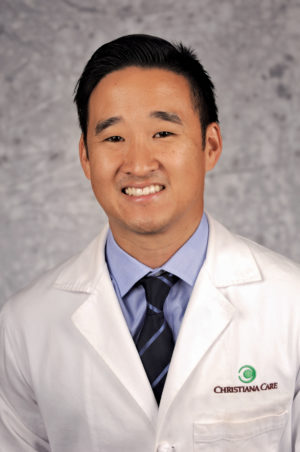
“Allison’s CPR was so good and so quick that, amazingly, her father did not have much in the way of cardiac or neurological deficits from lack of oxygen,” said Dr. Shao, of Christiana Care Cardiology Consultants.
“If she had not been home that morning — known what to do and acted so quickly — he would not have made it to the hospital,” he said. “She saved his life, no question.”
Kleinschmidt spent eight days on a ventilator in the cardiovascular intensive care unit at Christiana Hospital. Eventually, he progressed to the telemetry unit.
Before his heart attack, Kleinschmidt’s routine was to run two three- to four-mile runs each week and one longer, five- to seven-mile run on the weekend. After nearly three weeks in a hospital bed, the running enthusiast, who had lost nearly 30 pounds and much of his strength, had to retrain his muscles just to walk again.
He wanted to run
Just after Labor Day, Kleinschmidt started the next leg of his journey to recovery — acute inpatient rehabilitation at the Center for Rehabilitation at Wilmington Hospital.
One of the biggest determinants of a patient’s readiness for inpatient rehabilitation is his ability and willingness to participate in intensive therapy — as much as three hours every day. Patients must have perseverance and drive. Family support is key.
Jennifer Thomas, MBA, MS, CCC-SLP, vice president of Rehabilitation Services for Christiana Care, said the hallmark of rehab is the way the team works with patients to understand their passion for life.
Together, they set goals from day one and incorporate activities leading to that goal. Rehab plans include a combination of physical, occupational, speech and recreation therapies, as well as nutrition, psychosocial, case management and social work support.
Humbled by his second chance at life, Kleinschmidt’s goal was to run again. And not just run, but run a 5K with his daughter on New Year’s Day — less than four months away.
“Mark was the perfect example of somebody who, from the get-go, took hold of his rehab journey — his own future — with the support of his team,” said Thomas. “This is what rehab is all about.”
Physiatrist Kelly Eschbach, M.D., section chief, Physical Medicine & Rehabilitation, said once patients get past the medical crisis, her team’s role is to put some quality in their lives and make sure they are as independent as possible and get enjoyment out of life again.
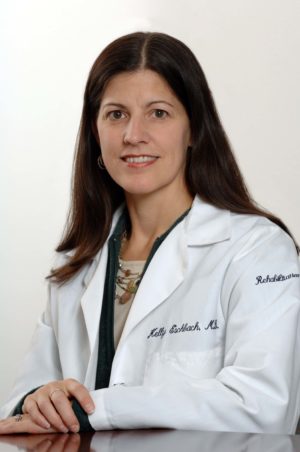
“This is exactly what we do in inpatient rehab,” she said. “The hospital team focuses on intense medical issues. We focus on function.”
Dr. Eschbach admits her team was a bit skeptical in early September when they first learned of Kleinschmidt’s goal to run again on New Year’s Day.
“He was one of the most determined guys I’ve ever seen come through here,” she said. “He had really good family support, and he understood just how lucky he was. He wanted to make the most of that opportunity. Our job was to support him in reaching those goals.”
Stories like Mark Kleinschmidt’s remind Dr. Eschbach and her team why they chose rehab as a specialty.
“We have the joy of spending time with patients and families, the luxury of getting to know them and help them work toward their goals,” she said. “It is extremely rewarding to see people get their independence back. The best thing in the world is when they don’t need us anymore.”
The inpatient rehab therapy team works closely with patients for hours a day, weeks on end to prepare them to return home as safely and independently as possible. But the outcome, said Kleinschmidt’s occupational therapist, Bethany Panchak, OTR/L, is determined by the patient.
“Mark was very motivated and very driven. He wanted to get back to his routine of work and exercise. He was ready to do anything we gave him,” she said.
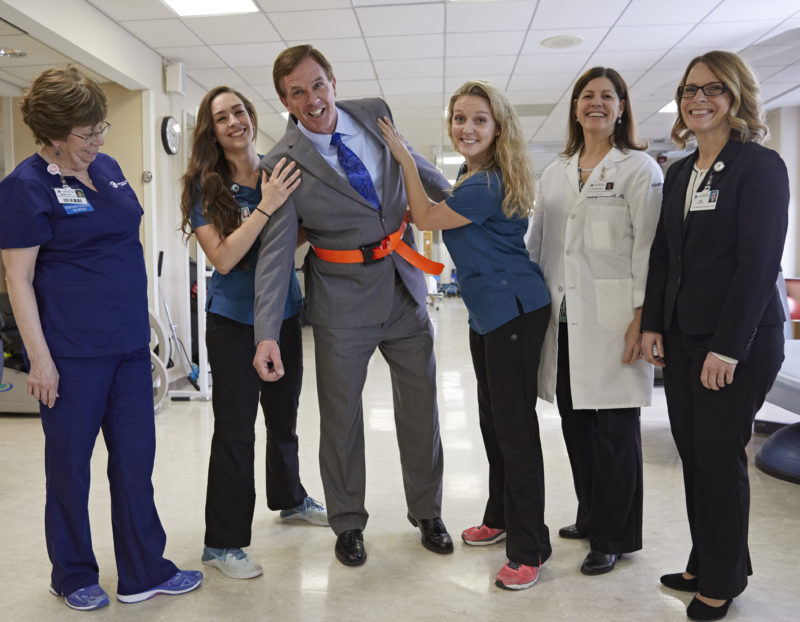
Before he could resume running, Kleinschmidt needed to build muscle strength and work on balance and coordination. Brooke Walters, PT, DPT, his physical therapist, incorporated activities to help him progress toward what was important to him.
“Rehab is a stepping stone; it gets you going in the right direction,” said Walters.
Rehab Charge Nurse Mary Pat Laws, MSN, RN III, CCRN, said education about medications and other self-care instructions are an important part of the inpatient rehabilitation phase of a patient’s recovery.
“We treat the whole body, patient and family to make sure their transition from the hospital setting to community is done in a way that makes sure the patient continues on the path to recovery without worry,” she said.
She said those who specialize in rehabilitation are particularly good at listening to what a patient is not saying, and many resources exist to help get patients through the low moments.
“There is a different and special bond that is built between a patient and his rehab team,” she said. “We are very much a family here in the Center for Rehab.”
Eye on the goal
Kleinschmidt’s daughters decorated his room on the 6th floor of Wilmington Hospital with his pre-heart attack race bibs. While he is quick to point out that he is no marathon runner, he admits that having articulated the goal to run again helped drive his recovery and rehabilitation.
Although Kleinschmidt was originally told to expect to spend up to three weeks in acute inpatient rehabilitation, thanks to his own hard work and help from the rehab experts, he was there just eight days.
Once he got home, he did outpatient cardiac rehabilitation and met with a Christiana Care behavioral health specialist to help him sort through the emotions that accompany surviving a medical crisis against all odds. He also worked with his doctor to come up with a safe training plan to start running again.
Health care in action
As someone who understood the business side of medicine but had never been sick a day in his life, Kleinschmidt was fascinated to watch health care in action at Christiana Care.
“The technology was unbelievable,” he said, referring to both cutting-edge medical equipment and the electronic health record that allowed all members of his care team to communicate with one another.
“When the doctors came in, they knew exactly what was going on because of notes in the EHR.” Along with his daughter’s ability to do CPR and the fact that he was in relatively good health going into this medical crisis, Kleinschmidt believes he is here today to share his story thanks to the coordinated care he received from the entire team at Christiana Care from the moment he arrived at the Emergency Department to his last day at outpatient Cardiac Rehabilitation.
“The value to our community in having a world-class medical institution like Christiana Care making a difference in people’s lives is just tremendous,” said Kleinschmidt. “The quality of care we get from Christiana Care is one of our great assets as a community.
“If I had been anywhere else than Christiana Care, I don’t know that I would be here today.”
The journey continues
With the New Year’s Day run under his belt, Kleinschmidt dreams about what comes next. Now retired from the County Chamber, he plans to find something he is “wildly passionate” about for the next leg of his journey. He has started a consulting practice, M2K Associates, “which uses my initials and references my second chance at life,” he said. He wants to make a difference by giving back to help others. To anyone traveling a similar path to recovery he says, “Onward! You can, and will get better.”
And he continues to run. In early March, he ran his first half-marathon, the Disney Princess Half Marathon at Walt Disney World Resort’s Epcot in Orlando. He had registered for it before the heart attack and, for obvious reasons, feared he would have to miss it.
“I did it!” he said. The distance wasn’t a problem, but he admits crossing the finish line was a bit emotional.
On March 18 he ran a relay portion of Wilmington’s Caesar Rodney Half Marathon and, and he plans to run Philadelphia’s Broad Street Run in May. He applauds the expertise and “career passion” of his Christiana Care care team.
“It’s not a job to the people of Christiana Care; it is a calling,” he said. “Everyone, from the doctors to the nurses, the rehab team, to those who cleaned my room, delivered my meals and drew my blood, really believe in what they’re doing. They chose this field because they know it makes a difference on a patient-by-patient basis.
“Thank you for having passion in what you do,” he said. “It takes special people, and I met a whole bunch of special people at Christiana Care, that’s for sure.”
